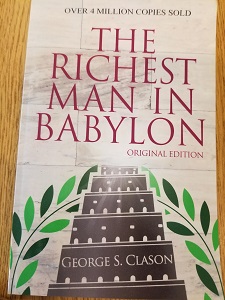
Photo credit: jb
Today we’ll continue on the journey of examining the lessons of George S. Clason’s exceptional book The Richest Man in Babylon. If you’d like to start back at the first lesson, you can find it here. Today’s lesson is from the chapter entitled “The Five Laws of Gold”.
The Five Laws of Gold
This chapter starts out like a predictable prodigal son story – from the viewpoint of the son, a fellow by the name of Nomasir, who was Arkad’s son (Arkad was the richest man in Babylon, introduced in the earlier reviews). The story is related by another man who knew Nomasir.
It seems that when Nomasir was ready to make his way in the world, his father gave him a bag of gold and a clay tablet, upon which were written the five laws of gold. As you might expect, Nomasir was foolish with the bag of gold, and only after losing it all did he review the five laws closely. They are as follows:
- Gold cometh gladly and in increasing quantity to any man who will put by not less than one-tenth of his earnings to create an estate for his future and that of his family.
- Gold laboreth diligently and contentedly for the wise owner who finds for it profitable employment, multiplying even as the flocks of the field.
- Gold clingeth to the protection of the cautious owner who invests it under the advice of men wise in its handling.
- Gold slippeth away from the man who invests it in businesses or purposes with which he is not familiar or which are not approved by those skilled in its keep.
- Gold flees the man who would force it to impossible earnings or who followeth the alluring advice of tricksters and schemers or who trusts it to his own inexperience and romantic desires in investment.
After reviewing these laws carefully and putting them into action in his own world, sought out advice from skilled investors, and began to build his fortune. Over the course of ten years (he was to return to his father after this time) Nomasir built quite a life (as well as fortune) for himself. Upon his return to his father’s home, he paid back the original bag of gold, and then paid two more bags in exchange for the five laws.
The first three we’ve covered in the earlier reviews – save at least 10%, invest your money to compound the returns, and follow the advice of people who understand how to make money. These are foundational concepts that certainly bear repeating.
The fourth law is an expansion of the third: make sure you understand your investments. This is one of the reasons that speculative investments like cryptocurrency don’t pass muster as a good idea. Not that the very concept of Bitcoin (or whatever the coin in question is) is so difficult to understand, it’s a store of value, much the same as a euro, a dollar, or a pound sterling is. What’s not understood is why the value increases or decreases, often wildly…? The coin is still the same as it was the day (or hour, or minute) before, but somehow it’s worth more (or less) than it used to be. It’s all owing to someone else’s estimation of the current value – rather than something produced by the coin itself. Because of this I’ll continue to repeat that cryptocurrency is not an investment, any more than a dollar is an investment. And until the valuation equation stabilizes, I see no need to hold assets valued by a cryptocurrency, unless a marketplace I want to participate in requires it. (And yes, I know that some people make money by investing in various currencies, but the average Jane or Joe doesn’t have much business in that activity either.)
And now to the fifth law: we all come across fraudsters and schemers who would like to part us from our money. It’s important to be able to recognize these. It may take some time at first to gain the recognition, but soon you get to the point where you can feel the sales pitch, and you can tell it’s a fraudulent (or at best, hypersold) activity or investment. Steering clear of these things is critical to advancing your wealth safely.
Lesson: The first three laws have been covered previously, but are always worth repeating. The last two are important to remember – keep your investing activities in the well-understood and proven realms. Much like Warren Buffett has preached, it’s important to invest in something you understand – and with the advice of those who’ve been there before.
The next section will cover the chapter “The Gold Lender of Babylon” – which provides interesting lessons for those who are asked by family members or close friends for a loan.